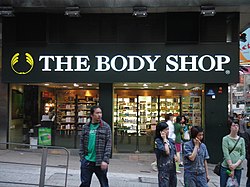利用者:Mkei/作業中の項目/ザ・ボディショップ



ザ・ボディショップ(The Bodyshop)はイギリスに本社を置く化粧品販売の多国籍企業である。2006年3月17日、フランスの化粧品会社ロレアルに6億5200万ユーロで買収された。本部はイギリスウェスト・サセックス州リトルハンプトンに置かれている。アニータ・ロディックによって設立され、動物実験を行わない独自の製品ラインや、持続可能で環境に配慮した方法で生産していることなどで有名である。
歴史
[編集]1970年、アニータ・ペレラと、後にアニータと結婚するゴードン・ロディックはサンフランシスコベイエリアに訪れ、バークレー市テレグラフ通りでシャンプー、ローション、クリームを販売している店に出会った。地元の起業家2人によって設立されたその店もまた「ザ・ボディショップ」と呼ばれていた。そして、新しい容器を買う代わりに使用済み容器を持っていくことで割引をすることで、環境に配慮していることを宣伝していた。最初の「ボディショップ」は1980年代初頭に名称使用権をロディックに売却し、現在は「ボディタイム(Body Time)」という名称で、ベイエリアにおいて小さなチェーン店を展開している[1]。
1976年3月26日、ロディックは25の手作りの天然製品のみを商品として、イギリスブライトンに1号店を開店させた。このとき、店舗の隣は葬儀屋であり、店舗名「ボディショップ」について自治体に苦情を出している。近所にあった地元出版社はボディショップが閉店するまでどのくらいもつか賭けをした。それらの反対勢力への応答として、アニータロディックは「私は生計を立てる子持ちの主婦である」と自治体に手紙を書いている。
Like the San Francisco store, The Body Shop offered homemade skin care and moisturizing lotions advertised to be made with natural ingredients. Products featured exotic ingredients such as jojoba oil and rhassoul mud from local herbalists and had simple, descriptive names such as Tea Tree Oil (Melaleuca Oil) Facial Wash and Mango Dry Mist. In contrast to high street retailers, the packaging included details about ingredients and their properties. Customers could return to the store to refill product containers for a 15 percent discount.
Products were priced between the mass market and exclusive designer brands, and were never sale priced. Eschewing traditional cosmetics marketing, the company promoted itself with offbeat brochures, exotic ingredients, and a founder who made herself extremely accessible and popular with the press. Roddick made social and environmental activism the centrepiece of her company's marketing.
These were revolutionary ideas in the industry, and inspired a loyal clientele. By the end of the 1970s a chain of outlets had sprung up throughout the UK, and Anita Roddick hired a public relations firm to manage the ever-growing press attention.
The Body Shop experienced rapid growth, expanding at a rate of 50 percent annually. Its stock was floated on London's Unlisted Securities Market in April 1984, opening at 95 pence. In January 1986, when it obtained a full listing on the London Stock Exchange, the stock was selling at 820 pence. By 1991 the company's market value stood at £350 million ($591 million). After a volatile period of ups and downs, including the selling of the Littlehampton manufacturing plants and outsourcing of manufacturing in 2000, its 2004 market value would end up about the same as in 1991 (£334 million as of September 2004).
社会的活動
[編集]From early on, The Body Shop reflected the activism of its founder Roddick, through billets posted on shop windows to sponsorship of local charity and community events. Roddick criticized what she considered the environmental insensitivity of the industry and traditional views of beauty, and aimed to change standard corporate practices.
In 1986 The Body Shop formed an alliance with Greenpeace, campaigning to "Save the Whales", despite some concerns among franchisees that the head office was becoming too political. By 1990 Roddick had switched allegiances to Friends of the Earth, following disagreements with Greenpeace.
The Body Shop also promotes many values such as Community Trade, reflecting its avowed practice of trading with communities in need and giving them a fair price for natural ingredients or handcrafts they purchase from these often marginalized countries. The first CT activity in 1986 was a footsie roller which was supplied by a small community in Southern India (today known as Teddy Exports) and still a key CT supplier of the Body Shop[2]. Since then, The Body Shop has found many trade partners in parts of the world - in over 24 different countries - that often are overlooked by the local as well as the global society.
Critics of The Body Shop in the 1980s and 1990s called the organisation hypocritical in its pursuit of profit while espousing "social equality". It is said that some shareholders complained the company was failing to maximize profits, instead funneling money into social works projects overseas. In 1994, Jon Entine reported that the records of Britain's Charity Commission records show no charitable contributions from the company in its first 11 years of operation, and less than 1.5% of pretax profits (which is the US corporate average) in subsequent years (up until fiscal year 1993, the latest year reported at the time). The criticisms were redoubled in 1999, however, when poor trading decisions led to the loss of 300 jobs at the Littlehampton manufacturing plants.
Advocates of the Body Shop however, enjoy their nature-inspired products and appreciate the fact that this company induces to promote these humanitarian values to such a wide audience.
The Body Shop and its franchisees fund a charitable foundation, The Body Shop Foundation, as well as a number of other ventures such as Children On The Edge, which works with disenfranchised children in Eastern Europe and Asia.
「援助ではなく取引を!」
[編集]By 1991, The Body Shop's "Trade Not Aid" initiative with the objective of "creating trade to help people in the Third World utilise their resources to meet their own needs" had started a paper factory in Nepal employing 37 people producing bags, notebooks and scented drawer liners. Another initiative was a 33,000 square foot (3,000 m²) soap factory in the depressed Glasgow suburb of Easterhouse, whose payroll included 100 residents, some previously chronically unemployed.
Sometimes considered anti-capitalist or against globalization, The Body Shop philosophy is in fact in favour of international marketplaces. The chain uses its influence and profits for programmes such as Trade Not Aid, aimed at enacting fair labour practices, safe working environments and pay equality.
The Body Shop is banned in China, because cosmetics sold there have to be tested on animals, according to Roddick. [1]
The Body Shop has undertaken periodic independent social audits of its activities (see its website).
On 17 March 2006, The Body Shop International agreed to a £652 million takeover offer by L'Oréal.
脚注
[編集]- ^ “Aromatherapy Essential Oils, Organic Essential Oils, Pure Essential Oils, and Pure Organic Essential Oils from Body Time”. 2月27日閲覧。accessdateの記入に不備があります。
- ^ http://www.thebodyshopinternational.com/Values+and+Campaigns/Our+Values/Support+Community+Trade/Home.htm
